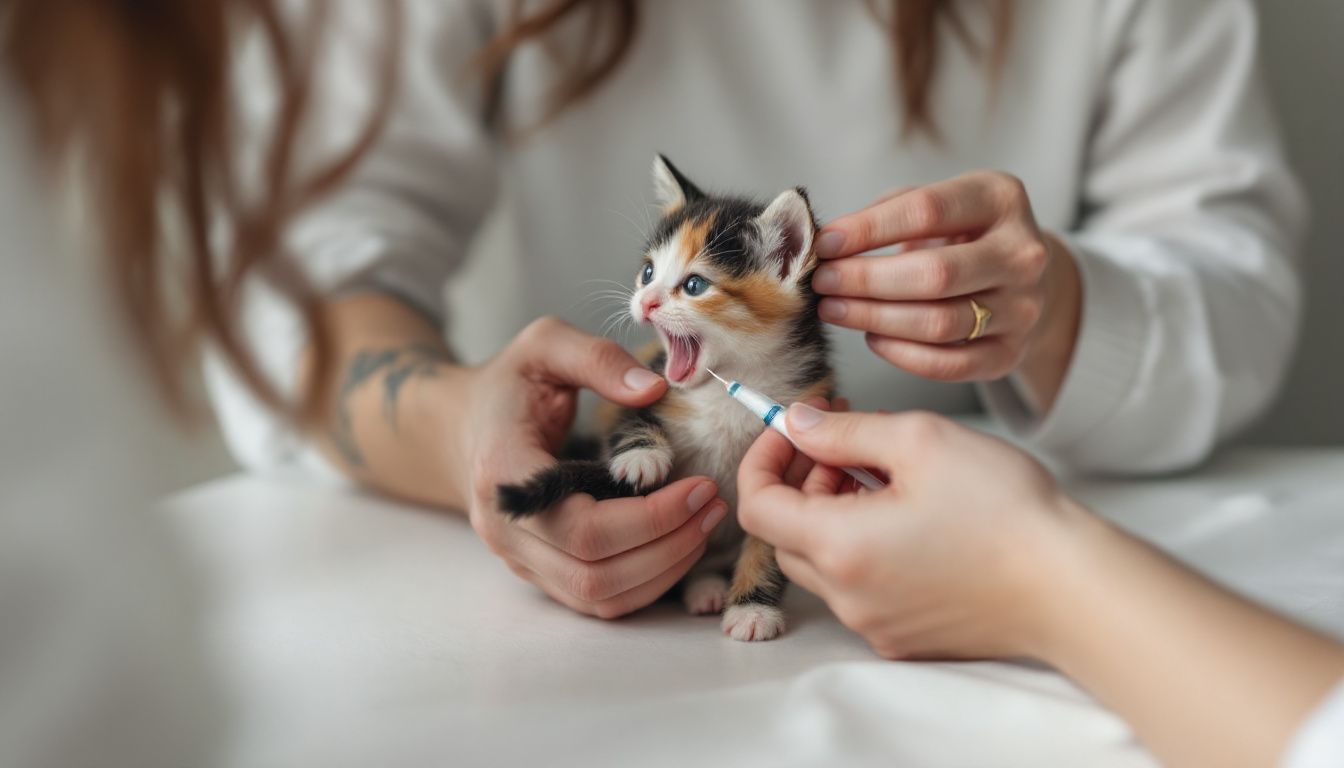
Deworming your kitten is an essential step in keeping them healthy and happy. Worms like roundworms and tapeworms are common in kittens, often passed through their mother’s milk or by ingesting infected fleas. These parasites can cause serious health issues, including diarrhea, weight loss, and a dull coat.
Luckily, you can protect your kitten from these risks with the right approach.
Start by identifying the type of worms your kitten might have. Roundworms, for example, are found in up to 75% of kittens and can spread through contaminated soil or feces. Once you know what you’re dealing with, you can consult a vet and choose the safest treatment.
Wondering how do you deworm a kitten? Don’t worry—it’s simpler than you think when you follow the right steps.
Why Deworming is Important
Health Risks of Worms in Kittens
Worms might seem small, but they can harm kittens a lot. These parasites take important nutrients, making kittens weak and unhealthy. If not treated, worms can cause diarrhea, vomiting, and dehydration. In bad cases, worms may block the intestines, which is very dangerous. Some worms, like roundworms, can infect people too. This is risky if you have kids or older family members. Worms can spread diseases from animals to humans. Keeping your kitten worm-free also keeps your family safe.
Waiting to deworm makes these problems worse. Kittens with worms can’t grow well because they lose nutrients. This can cause poor growth and health problems later.
Benefits of Deworming
Deworming removes worms and helps kittens stay healthy. Here’s why it’s good:
-
Kittens absorb nutrients better, helping them grow strong and healthy.
-
Stops health issues like stomach problems and weight loss caused by worms.
-
Lowers the chance of worms spreading to people, keeping everyone safe.
Deworming also give you a peace of mind. You’ll know your kitten is free from worms and can play happily. Regular deworming keeps kittens healthy as they grow up. To make it simple, track your kitten’s deworming dates. If you adopted them, ask for their deworming history. This avoids missed treatments and keeps your kitten healthy.
Not sure how to deworm a kitten? Don’t worry—it’s easy if you follow the steps.
How Can You Deworm a Kitten Safely?
Deworming a kitten may seem hard, but it’s simple. With the right tools and steps, you can do it easily.
What You’ll Need
Before starting, gather these items to make things easier:
-
Vet-recommended deworming medicine
-
A syringe or dropper for giving the medicine
-
Treats to reward your kitten afterward
-
A soft towel to hold your kitten gently
-
A quiet spot where your kitten feels safe
Having these ready makes the process smooth and stress-free.
Step-by-Step Guide
Step 1: Talk to Your Vet
Always ask your vet first. They’ll check what worms your kitten has and suggest the best medicine. Common vet-approved medicines include Revolution®, Revolution Plus®, and Profender™. Your vet will also tell you the right dose based on your kitten’s size and age.
Step 2: Pick the Right Medicine
Different worms need different treatments. For example, roundworms and tapeworms need separate medicines. Your vet’s advice ensures you use the correct one. Stick to trusted brands and avoid over-the-counter options unless approved by your vet.
Step 3: Give the Medicine
This step might feel tricky, but it’s doable. Wrap your kitten in a towel to keep them calm. Use the syringe or dropper to place the medicine in the side of their mouth. Be gentle but firm, and make sure they swallow it. If they resist, pause and try again later.
Step 4: Care After Treatment
After giving the medicine, watch your kitten for side effects like vomiting. Reward them with a treat and give them water to stay hydrated. If anything seems wrong, call your vet quickly.
Mistakes to Avoid
When deworming a kitten, some mistakes are common. Here’s what to avoid:
-
Missing follow-up doses. Many medicines need more than one dose to work.
-
Skipping scheduled treatments. Kittens need deworming at specific times, starting at 2 weeks old.
-
Trusting a breeder or shelter without checking. Always confirm with your vet.
Avoiding these mistakes keeps your kitten healthy and free of worms.
Potential Challenges and How to Overcome Them
Deworming a kitten can sometimes feel tricky, especially if it’s your first time. But don’t worry—most challenges have simple solutions. Let’s look at some common issues and how you can handle them.
-
Your Kitten Refuses the Medicine
Some kittens don’t like the taste of deworming medicine. If this happens, try mixing the medicine with some wet food or a treat they love. Use a syringe or dropper for liquid medicine and aim for the side of their mouth. This makes swallowing easier. If they still resist, ask your vet about flavored options. -
You’re Unsure About the Right Dose
Giving too much or too little medicine can be harmful. Always follow your vet’s instructions carefully. If you’re unsure, double-check with your vet before giving the medicine. Never guess the dose based on your kitten’s size or age. -
Your Kitten Spits Out the Medicine
Kittens can be squirmy, and some might spit out the medicine. Wrapping your kitten in a soft towel can help keep them calm and still. Hold them gently but firmly. If they spit it out, don’t panic. Wait a few minutes and try again. -
Side Effects After Deworming
It’s normal for kittens to feel a little off after deworming. They might have mild diarrhea or seem tired. Keep an eye on them and make sure they’re drinking water. Call your vet immediately if symptoms last more than a day or seem severe. -
You’re Nervous About the Process
It’s okay to feel unsure. Deworming gets easier with practice. Start by asking your vet to show you how to do it. Watching a professional can boost your confidence. Remember, you’re helping your kitten stay healthy, and that’s what matters most.
Wondering how do you deworm a kitten without stress? Preparation is key. Gather everything you need beforehand, and stay calm. Your kitten will pick up on your energy, so a relaxed approach makes the process smoother.
You can overcome these challenges with patience and the right techniques and ensure your kitten stays worm-free.
Signs That Your Kitten Might Have Worms
Look for these signs to catch worms early:
-
Swollen belly: A big, round tummy in kittens can mean worms.
-
Upset stomach: Worms may cause diarrhea or make your kitten throw up.
-
Losing weight: Even if eating well, worms steal their food’s nutrients.
-
Rough fur: Healthy kittens have shiny fur. Dull fur might mean worms.
-
Worms in stool: You might see worms or white bits near their bottom.
If you notice these signs, act quickly. Worms can hurt your kitten’s health and growth.
Different Worms That Affect Kittens
Kittens can get various worms, and each needs special care:
-
Roundworms: These are very common and spread through milk or dirt.
-
Tapeworms: Kittens get these by eating fleas while cleaning themselves.
-
Hookworms: These tiny worms cause blood loss and come from dirty areas.
-
Heartworms: Mosquitoes spread these worms, which harm the heart and lungs.
-
Protozoa: Tiny parasites like Giardia can cause diarrhea in young kittens.
Knowing the type of worm helps you pick the right treatment.
How Vets Confirm Worm Types
Your vet can figure out what worms your kitten has using these methods:
-
Stool check: Bring fresh poop for the vet to look for worms.
-
Egg test: A special solution helps find worm eggs under a microscope.
-
Protein test: This test finds worm proteins even if no eggs are seen.
-
Larvae test: If lungworms are suspected, this test checks for their babies.
These tests help your vet choose the best treatment. If you’re unsure how to collect a stool sample, ask your vet for help.
Finding worms might seem hard, but these steps make it easier to keep your kitten healthy.
Stopping Worms from Coming Back
Deworming is just the start to keep your kitten safe. Follow these easy tips to stop worms from returning and keep your kitten healthy.
Keep Things Clean
A clean home helps stop worms. Worms like dirty places, so clean your kitten’s area often. Scoop the litter box every day and change the litter weekly. Wash food and water bowls daily with hot, soapy water to kill germs.
If your kitten goes outside, wipe their paws when they return. This helps remove worm eggs from the dirt. Wash their bedding often with pet-safe soap and hot water to kill hidden parasites.
Control Fleas
Fleas can give kittens tapeworms, so stop fleas early. Use a flea comb dipped in soapy water daily for kittens under eight weeks. This removes fleas without using strong chemicals.
Older kittens can use safe flea treatments like Capstar, FirstAct Plus, or Advantage. Capstar works for kittens four weeks old and over two pounds. Frontline Plus and Advantage work for kittens eight weeks or older, depending on weight. These treatments kill fleas and stop tapeworms.
Visit the Vet Often
Regular vet visits help find and stop worms early. Vets can test stool for worms, even if your kitten looks fine. They’ll also suggest a deworming plan that fits your kitten.
Ask your vet about medicines that prevent worms and fleas. Some medicines protect against many parasites. Staying on top of vet care keeps your kitten happy and healthy. These steps will help keep your kitten’s home safe and worm-free. It’s easier to stop worms than to treat them, and your kitten will love you for it!
Deworming your kitten doesn’t have to feel overwhelming. Just follow these key steps: identify the type of worms, consult your vet, choose the right dewormer, and administer the treatment carefully.
Each step ensures your kitten gets the care they need to grow healthy and strong. With the right guidance, you’ll find that deworming is a manageable process. You’re not alone—your vet is there to help, and your kitten will thank you with their playful energy and purrs. Don’t forget to take preventative measures like regular deworming, keeping their space clean, and using flea control. These small steps make a big difference in keeping your kitten worm-free and happy.
FAQ
How often should you deworm a kitten?
Deworm kittens every two weeks from 2 to 12 weeks old. After that, do it monthly until they’re six months old. Adult cats need deworming every three months. Follow your vet’s advice for the best plan.
Can you deworm a kitten at home without a vet?
It’s possible, but asking a vet first is safer. They’ll suggest the right medicine and dose. Store-bought dewormers might not work for all worms and could harm your kitten if used wrong.
What happens if you don’t deworm your kitten?
Worms can cause poor growth, malnutrition, and serious health issues like blocked intestines. Some worms can even infect humans. Deworming keeps your kitten and family safe.
Are there natural remedies for deworming kittens?
Some say pumpkin seeds or coconut oil help, but they’re not proven. Natural remedies may not remove all worms. Vet-approved treatments are the safest and most effective choice.
Can kittens get worms again after deworming?
Yes, they can get worms again from dirty soil, poop, or fleas. Regular deworming, flea control, and keeping things clean help stop reinfection.

In her previous life, Lisa traveled extensively, both for work and leisure. After the pandemic struck, Lisa locked up her luggage and adopted a cat ever since.
Lisa is now an avid cat lover, she devotes most of her free time serving as butler to her adorable feline at home. When she is not with her cat, she can be seen using her phone sourcing for the latest cat supplies online.


